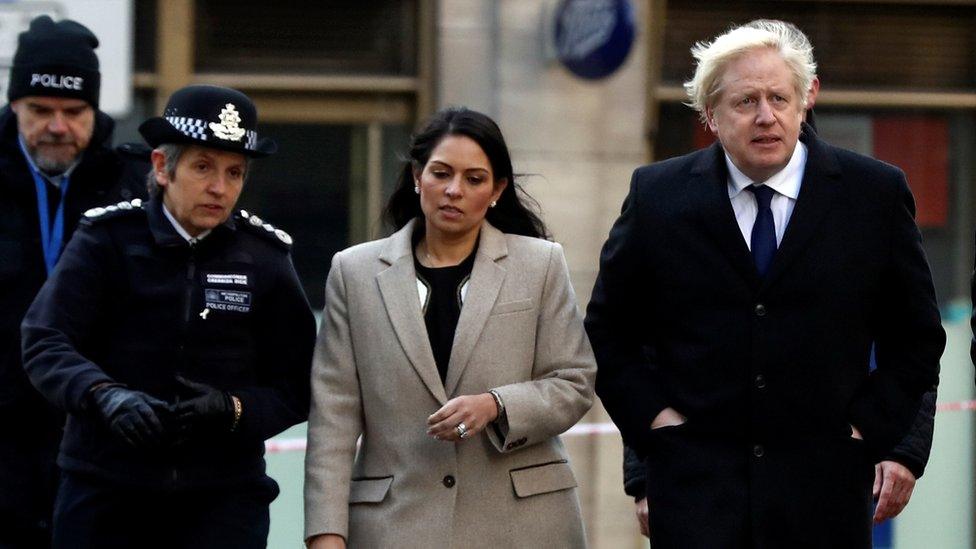Priti Patel 'sickened' by Charing Cross police behaviour
- Published
Priti Patel "appalled and sickened" by a report showing misogyny, discrimination, bullying and sexual harassment in Met Police
Home Secretary Priti Patel has said she was "appalled and sickened" by the behaviour of Metropolitan Police officers revealed in a report.
The officers mainly based at Charing Cross, in London, were found to have joked about rape, killing black children and beating their wives.
The Met said it was "deeply sorry", after the Independent Office for Police Conduct (IOPC) published its findings, external.
But Ms Patel said the force had "problems" with its culture.
She told the Commons Home Affairs Committee that examples of "appalling conduct" by serving officers could not be dismissed as "one-off" incidents.
Asked if the Met was institutionally misogynist, she said it had "cultural and attitudinal" issues, suggesting a "failure of leadership in some quarters".
But she said she had confidence in Metropolitan Police Commissioner Cressida Dick to make the changes that were required.
Pressed about Ms Dick's future, Ms Patel said she was "very clear and upfront with the commissioner about the problems… I'm very challenging with the commissioner and I will continue to be so."
'Bullying and aggressive'
Ms Patel did not rule out launching a major inquiry into policing, like the 1999 Macpherson report into the murder of black teenager Stephen Lawrence, which labelled the Met "institutionally racist".
The home secretary said: "There are no excuses for the appalling behaviour and what we have seen in that IOPC report and it is quite clear there are cultural problems and issues in policing."
But, she added she wanted to "find out what on earth is going on" through existing, smaller scale inquiries launched after the murder of Sarah Everard by Met Police officer Wayne Couzens, before deciding whether to go further.
One probe, led by Dame Elish Angiolini QC, will look at previous criminal and misconduct allegations against Couzens, and whether any red flags were missed when he was vetted.
A separate review, led by Baroness Louise Casey, is looking at the culture and standards within the Met Police, and its vetting, recruitment and training procedures.
The IOPC launched its investigation in 2018 after an officer allegedly had sex with a vulnerable woman in a room inside a London police station - although this allegation was never proven.
In its report, published on Tuesday, the police watchdog identified "bullying and aggressive behaviour; 'banter' used to excuse oppressive and offensive behaviours; discrimination; toxic masculinity, misogyny and sexual harassment".
"We believe these incidents are not isolated or simply the behaviour of a few 'bad apples'," the IOPC said in a statement.
Evidence uncovered included:
Messages about police officers attending a festival dressed as known sex offenders - sent within a WhatsApp group containing 17 police officers
Numerous messages about rape within WhatsApp and Facebook chat groups
Homophobic comments
Use of words that could be considered misogynist, racist, or constituting disability discrimination
Of the 14 officers investigated, two were dismissed for gross misconduct and put on the barred list, preventing future employment with the police.
Another two resigned and several others faced disciplinary action, the IOPC said.
Nine are still serving with the force, while another is working as a contractor in a staff role.
In Parliament on Wednesday, MPs expressed disgust at the findings of the IOPC report, which Home Office Minister Kit Malthouse said described "abhorrent behaviour" that "shamed" the Met Police.
Conservative MP Matthew Offord, who called for the urgent question, criticised the mayor of London, Sadiq Khan.
"We need leadership on keeping London safe and that is not happening," Mr Offord said.
Mr Khan has said he was "utterly disgusted" by the findings, adding: "Anyone found to be responsible for sexism, racism, misogyny, Islamophobia, anti-Semitism, bullying or harassment does not deserve to wear the Met uniform and must be rooted out."
In a statement, the Met said: "We are deeply sorry to Londoners and everyone they have failed with their appalling conduct and acknowledge how this will damage the trust and confidence of many in the Met.
"Since this reprehensible behaviour was uncovered in 2017 we have taken a series of measures to hold those responsible to account and stamp out unacceptable behaviour."
- Published2 February 2022
